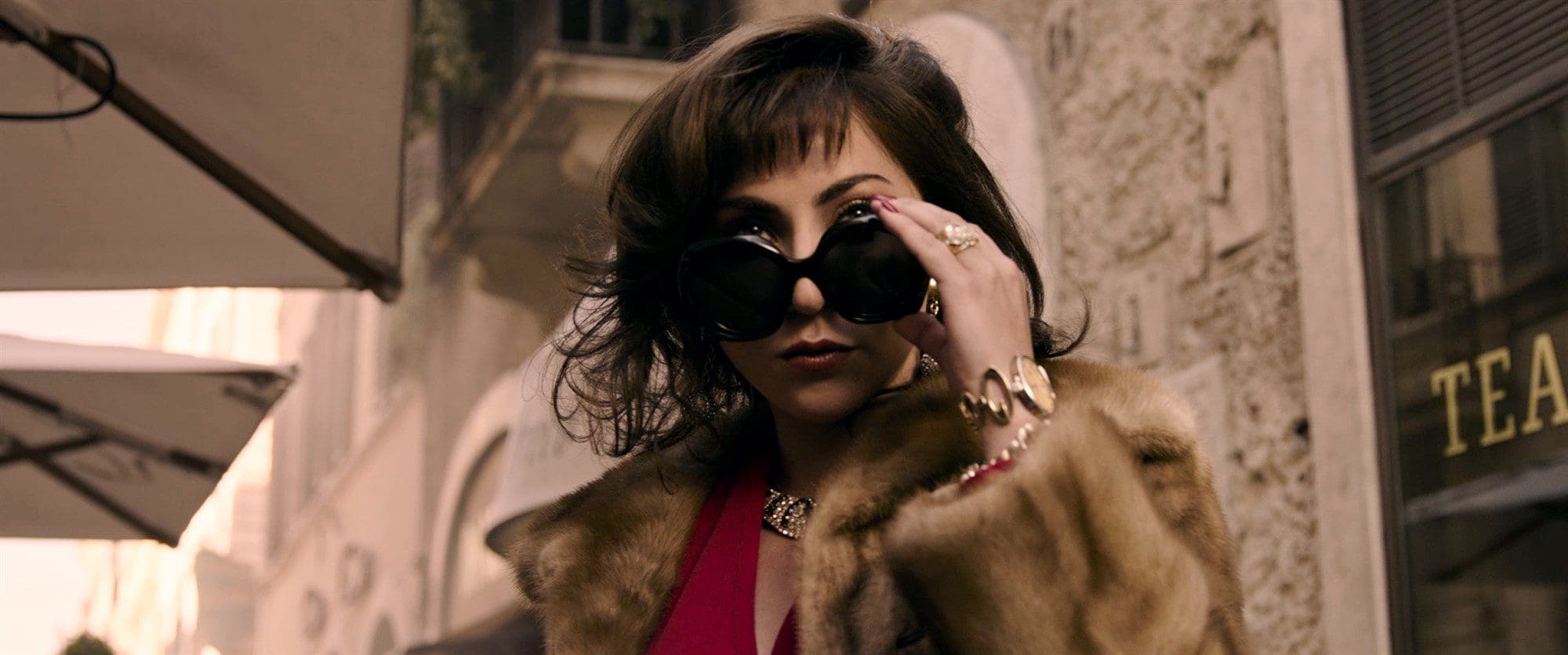
In the opening narration of House of Gucci, Patrizia Reggiani (Lady Gaga) says Gucci is a name “synonymous with wealth, style, power.” Even for those who have little interest in or knowledge of fashion, Gucci still conjures images of models draped in designer clothing and purses that cost more than you’ll make in a year. It’s potent imagery, instantly calling to mind the kind of excess and luxury that makes for entertaining viewing. Combined with the salacious story of murder the movie is based on, there’s a lot of potential for just the right mix of glitz, glamour, and sleaze to make for a classic.
It’s a promise that House of Gucci often lives up to. Director Ridley Scott takes full advantage of his subject matter, soaking the movie in as much of that special kind of tasteless excess the rich can get away with as he can manage. The ridiculous Italian accents, pulled off with varying degrees of success by the cast, make the inevitable outbursts and screaming matches all the sillier and more fun. Without getting into the debate over what is or is not camp, there is certainly an awareness of the entertainment value of something both entirely self-serious and a little absurd. When House of Gucci gets to live in those moments, it truly shines.
Unfortunately, the movie falls prey to a problem that plagues so many biopics: an obsession with the details. At a bloated two hours and thirty seven minutes, House of Gucci attempts to track every bit of minutiae along the arc of Patrizia’s relationship with Gucci heir Maurizio Gucci (Adam Driver). But this instinct to capture everything is a trap, resulting in a final product that feels unfocused as it meanders from scene to scene with little purpose. As the runtime goes on, it becomes difficult to tell exactly when anything is supposed to be happening, years arbitrarily skipping by with little rhyme or reason.
What’s worse, this fastidiousness means we often spend long stretches of time between the juicy bits of drama doing nothing in particular, undercutting any sense of tension or build-up. Though over the arc of the movie we can see the tensions amongst the Gucci family and between Maurizio and Patrizia ratchet up until they reach the breaking point, in practice, it feels so much more ambling and unfocused. A scene where we can see the cracks forming in their marriage might be followed by any number of scenes of aimless shopping, lavish parties, or talk of company shares and business practices, none of which feel either vital or entertaining. By the time we return to the drama, the thought of the last moment has long been banished from our mind, making the movie feel more like isolated flare-ups of campy fun than a slow-burn of resentment and revenge.
It doesn’t help that not every actor seems to be on the same page as to how silly they’re supposed to be. Some, like Adam Driver as Maurizio or Jack Huston as family lawyer Domenico de Sole, are largely subdued. They prefer to play it cool, letting the outbursts of others wash over them with nothing but a strained smile. It works well for the scenes where they play opposite a more expressive partner, but the scenes anchored by their characters begin to feel like a different, more grounded movie than the one they’re actually in.
On the complete opposite side of the spectrum, there’s Jared Leto as black sheep of the family Paolo Gucci. His lilting trill, warbling out lines in a vague approximation of an Italian accent that would embarrass Mario, is by several degrees the most over-the-top ridiculous thing in the movie. It’s certainly funny, and Leto goes for the performance with admirable gusto, but it’s so much more than everyone else that it becomes distracting. It’s difficult to take him seriously as a real person compared to everyone else around him, which becomes a problem when sympathy for Paolo becomes a vital part of the movie’s second half.
Perhaps unsurprisingly given the trajectory of her career, the only person who seems capable of striking a balance between the silly and serious is Lady Gaga. She wears some of the movie’s most audacious fashion, purrs out her lines in an exaggerated accent second only to Leto’s, threatens and yells and cries and pleads with melodramatic verve. Yet unlike Leto, this doesn’t come at the cost of her character. When she needs to be sweet, she radiates a charm that makes it clear how she can win over everyone around her. And when it all starts to fall apart, she extracts the sliver of humanity that keeps you invested in Patrizia. It’s not exactly her star-making role in A Star is Born, but it’s still an impressive performance.
There’s fun to be had in House of Gucci. The melodrama and glitz the trailers promise are there, and in those moments you can see the great movie it could have been. But it’s ultimately too long, too unfocused, too bogged down in the details. A campy classic is aching to be born, but it’s drowned out by too much noise. It’s not a bad movie, but it’s the kind that leaves you feeling like it could have been so much better.


Comments are closed.